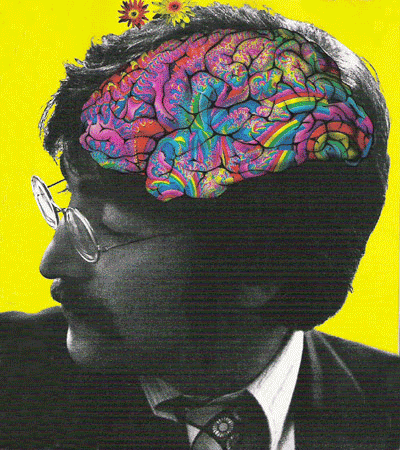Déjà vu, from French, literally "already seen", is the phenomenon of having the strong sensation that an event or experience currently being experienced has been experienced in the past, whether it has actually happened or not.
Scientific research
The psychologist Edward B. Titchener in his book 1928 A Textbook of Psychology, explained déjà vu as caused by a person having a brief glimpse of an object or situation, before the brain has completed "constructing" a full conscious perception of the experience. Such a "partial perception" then results in a false sense of familiarity.[1] The explanation that has mostly been accepted of déjà vu is not that it is an act of "precognition" or "prophecy", but rather that it is an anomaly of memory, giving the false impression that an experience is "being recalled".
One theory is the events are stored into memory before the conscious part of the brain even receives the information and processes it.[4] However, this explanation has been criticized that the brain would not be able to store information without a sensory input first. Another theory suggests the brain may process sensory input (perhaps all sensory input) as a "memory-in-progress", and that therefore during the event itself one believes it to be a past memory. In a survey, Brown had concluded that approximately two-thirds of the population have had déjà vu experiences.
Other Theories
The Hologram Theory
Dutch psychiatrist Hermon Sno proposed the idea that memories are like holograms, meaning that you can recreate the entire three-dimensional image from any fragment of the whole. The smaller the fragment, however, the fuzzier the ultimate picture. Déjà vu, he says, happens when some detail in the environment we are currently in (a sight, sound, smell, et cetera) is similar to some remnant of a memory of our past and our brain recreates an entire scene from that fragment.
Other researchers also agree that some small piece of familiarity may be the seed that creates the déjà vu feeling. For example, you might go for a ride with a friend in an old 1964 Plymouth and have a strong déjà vu experience without actually remembering (or even being aware of the fact) that your grandfather had the same type of car and you're actually remembering riding in that car as a small child. Things like the smell and the look and feel of the seat or dashboard can bring back memories you didn't even know you had.
Dual Processing (or Delayed Vision)
Another theory is based on the way our brain processes new information and how it stores long- and short-term memories. Robert Efron tested an idea at the Veterans Hospital in Boston in 1963 that stands as a valid theory today. He proposed that a delayed neurological response causes déjà vu. Because information enters the processing centers of the brain via more than one path, it is possible that occasionally that blending of information might not synchronize correctly.
Efron found that the temporal lobe of the brain's left hemisphere is responsible for sorting incoming information. He also found that the temporal lobe receives this incoming information twice with a slight (milliseconds-long) delay between transmissions -- once directly and once again after its detour through the right hemisphere of the brain. If that second transmission is delayed slightly longer, then the brain might put the wrong timestamp on that bit of information and register it as a previous memory because it had already been processed. That could explain the sudden sense of familiarity.
"Memories" From Other Sources
This theory proposes that we have many stored memories that come from many aspects of our lives, including not only our own experiences but also movies, pictures we've seen and books we've read. We can have very strong memories of things we've read about or seen without actually experiencing, and over time, these memories may be pushed back in our minds. When in we see or experience something that is very similar to one of those memories, we might experience a feeling of déjà vu.
For example, as a child we may have seen a movie that had a scene in a famous restaurant or at a famous landmark. Then, as an adult, we visit the same location without remembering the movie, and the location appears to be very familiar to us.










This comment has been removed by the author.
ReplyDelete